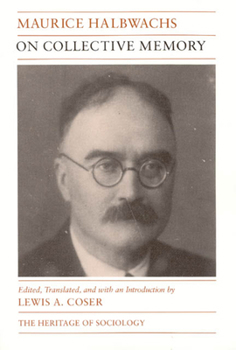On Collective Memory
Select Format
Select Condition 
Book Overview
How do we use our mental images of the present to reconstruct our past? Maurice Halbwachs (1877-1945) addressed this question for the first time in his work on collective memory, which established him as a major figure in the history of sociology. This volume, the first comprehensive English-language translation of Halbwach's writings on the social construction of memory, fills a major gap in the literature on the sociology of knowledge. Halbwachs'...
Format:Paperback
Language:English
ISBN:0226115968
ISBN13:9780226115962
Release Date:September 1992
Publisher:University of Chicago Press
Length:254 Pages
Weight:0.84 lbs.
Dimensions:0.6" x 6.1" x 9.1"
Related Subjects
History Politics & Social Sciences Social Philosophy Social Science Social Sciences TextbooksCustomer Reviews
3 ratings
Collective Memory
Published by Thriftbooks.com User , 18 years ago
Halbwachs, Maurice. On Collective Memory. Translated and edited by Lewis A. Coser. Chicago: University of Chicago Press, 1992. Memory reconstructs images from the past in the context of our social present. Maurice Halbwachs' important work on the formation of collective memory insists that any recalled events fundamentally exist as a function of group endeavour. These memories, and the different behaviours they sustain, rise from a selective process shaped by associations with classes, religions, and families. These social frameworks, he contends, provide the means to express memory through shared language and discourse. As such, all reconstructed pasts must draw on common conventions of beliefs and meanings. This stability accounts for the persistent strength of traditions, but also for changes to society that must first forge connections to past ways of understanding, in order to succeed. Beginning with family, Halbwachs examines the social contexts that determine collective memory. Although the wider meaning of family structure comes from society in general, the individual experiences within a family play a crucial role in forming memories through association. Traditions, legends, and proverbs, as well as emotional connections to places, allow the family unit to penetrate into the meanings the individual constructs in all other areas of life. The narrative and logic of family life, derived and adapted from societal norms, thus influence the forms that memory can take. Looking at religion, Halbwachs contends that formal doctrine represents a collective memory composed of rites and beliefs. He finds in religions a historical narrative of major historical events, manifested in more or less symbolic forms. Focusing on the Catholic Church, he demonstrates how a collective memory can adapt to new interpretations while retaining great internal stability and persistence of vision. He then turns to social classes, which he sees as something akin to Weberian status groups. He examines the workings of class traditions and legitimacy in the transitions between old and nouveau riche elites, arguing that while function defines class groups, meanings and assigned qualities come from the wider social relationships in which they participate. As societal hierarchies experience change, he argues, presentist justifications draw from traditions to construct a new collective memory where the new structure seems stable and acceptable. Evocative and thought provoking, Halbwachs' work offers an interesting approach to memory and its social construction. Similar to Hayden White's later argument of meta-narrative, he argues strongly, yet without much direct evidence, for the ubiquitous presence of societal pressures on individual creativity and personal spaces. Pierre Nora's work on memory in public history, and Eric Hobsbawm's on invention of traditions, further suggests the great influence of and legacy of Halbwachs. Nevertheless, several weak points stand out e
Just a word of advice for researchers
Published by Thriftbooks.com User , 19 years ago
I have just received the book and the text seems to be great. I only think it should be worth advising readers that the first four chapters of "The social frameworks of memory" are abridged versions of the original French book (THey are considered - and probably they are indeed - "largely preparatory for what is to come in the rest of the book. Only relatively brief central pages if these chapters have been translated here" (p. 37). Not that this poses a problem for the comprehension of Halbwachs - since I trust the publishers, the translator and the editor -, I only think it might be useful information.
The foundation of the sociology of memory
Published by Thriftbooks.com User , 23 years ago
Maurice Halbwachs, french sociologist and student of Durkheim, died in Nazi camps in 1945. His work can be considered as the foundation of the sociology of memory, and is rediscovered today in Europe and in the US. An essential reading for any scholar interested in the relationship between history, memory, and the past.






